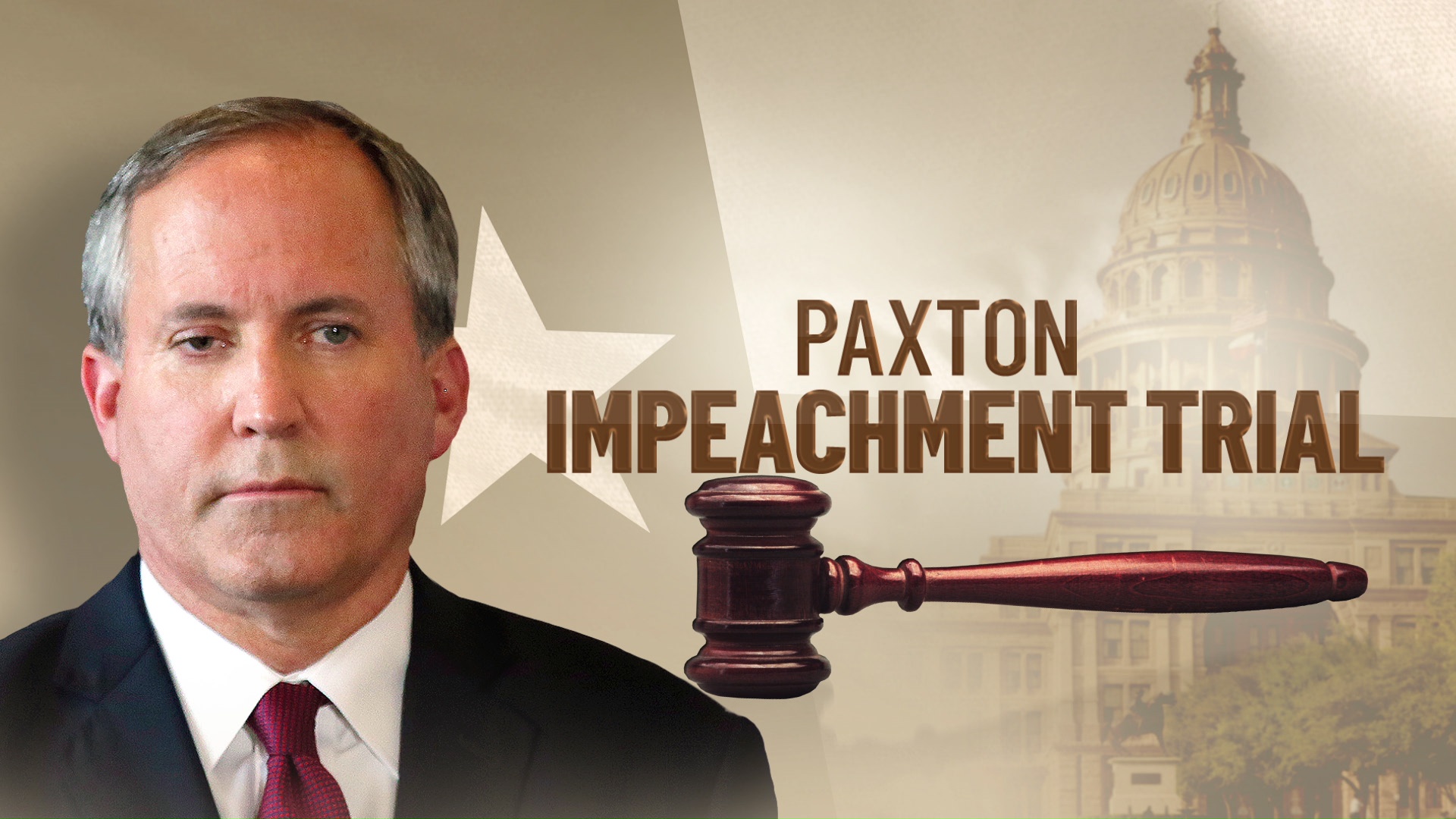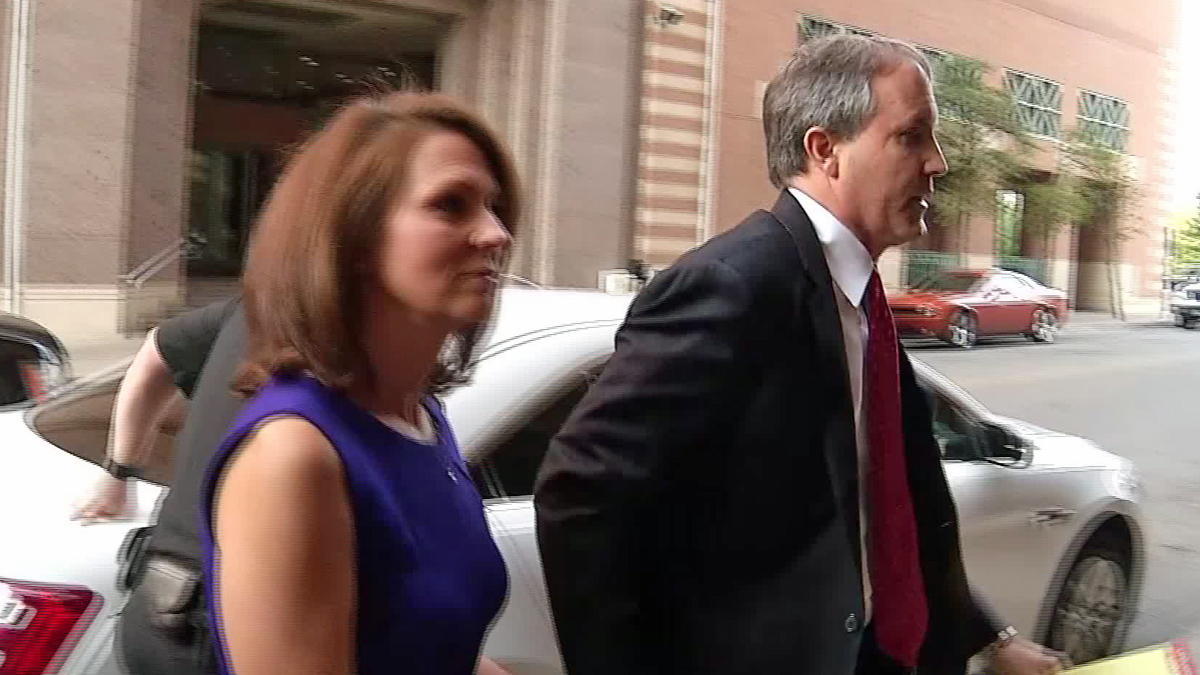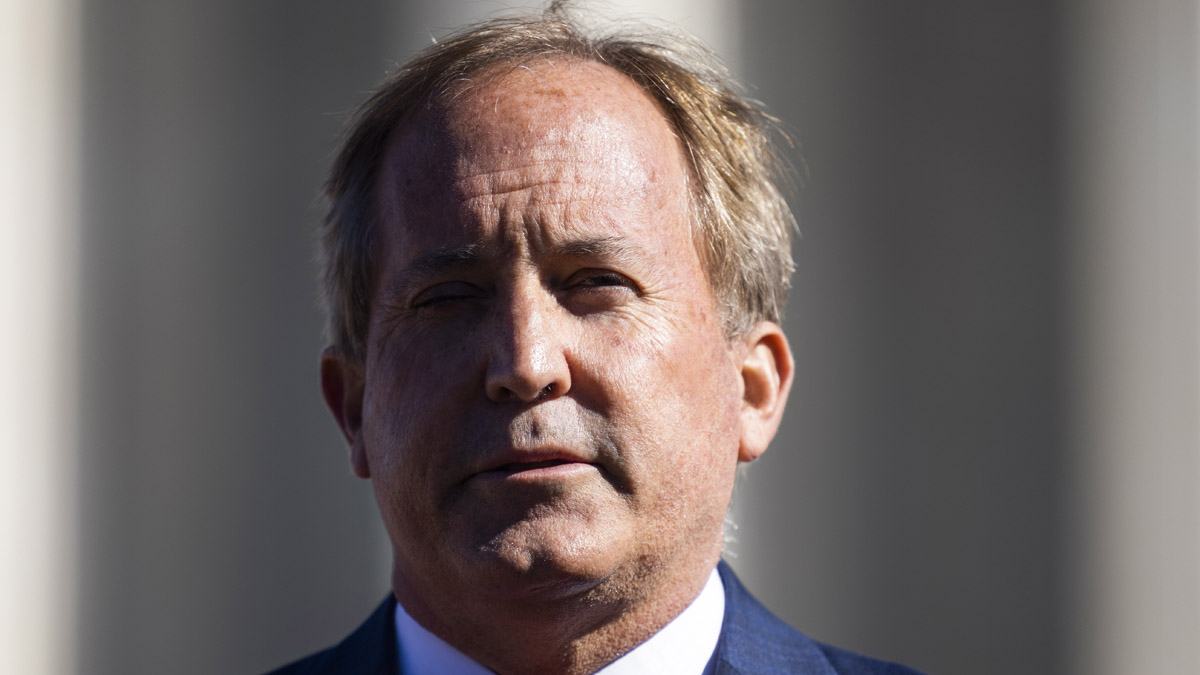
The Republican-led Texas House of Representatives has set a historic Saturday vote to possibly impeach embattled state Attorney General Ken Paxton and suspend him from office.
Paxton, a 60-year-old Republican, finds himself on the brink of impeachment after years of scandal, criminal charges and corruption accusations. The House will consider a resolution calling for Paxton's impeachment at 1 p.m. Saturday, according to a statement released Friday by the House Committee on General Investigating.
The five-member House General Investigating Committee, led by Rep. Andrew Murr (R-Junction) and made up of three Republicans and two Democrats, voted unanimously Thursday to send 20 articles of impeachment (listed below) against Paxton to the full chamber. A simple majority of the 149-member Texas House is needed to approve the articles. Republicans control the chamber 85-64.
The committee said they are proposing 40 minutes of opening remarks followed by four hours of debate for those who are both for and against impeachment. After the debate, the committee will present about 20 minutes worth of closing remarks.
Get DFW local news, weather forecasts and entertainment stories to your inbox. Sign up for NBC DFW newsletters.
If the full House votes to impeach Paxton, everything shifts to the state Senate for a "trial" to decide whether to permanently remove Paxton from office, or acquit him. Removal requires a two-thirds majority vote. If the House votes to impeach, Paxton is immediately suspended from office until the outcome of the Senate trial. Republican Gov. Greg Abbott would appoint an interim replacement.
Michael Maslanka, a professor of law at UNT Dallas School of Law, said the House essentially serves as a grand jury deciding whether there is enough evidence to someone to trial. The Senate is the actual trial, Maslanka said.
"Look at it as, it’s not like he’s [Paxton] doing a bad job. Or a job people disagree with. It’s that the alleged actions committed were of such quality and quantity that they warrant his actual removal from his elected office of attorney general," Maslanka said.
If the Senate does conduct a trial, Maslanka said it could raise another issue.
"There’s nothing in our laws that talk about how the Senate is to do the trial. So, the Senate has to establish first by law…how he has to be tried, and then they have to try him," he said.
The committee said Friday that the impeachment is the result of the attorney general asking the state to use taxpayer funds to pay the settlement reached in a whistleblower lawsuit.
"We cannot over-emphasize the fact that, but for Paxton's own request for a taxpayer-funded settlement over his wrongful conduct, Paxton would not be facing impeachment by the House," the committee wrote.
Paxton spoke publicly about the upcoming vote on Friday afternoon calling it "political theater" and adding that it was a curated "act of political retribution" that must come to an end. He invited his supporters to the Capitol on Saturday to peacefully let their voices be heard.
In February, Paxton agreed to settle a whistleblower lawsuit brought by former aides who accused him of corruption. The $3.3 million payout must be approved by the House and Republican Speaker Dade Phelan has said he doesn't think taxpayers should foot the bill. Shortly after the settlement was reached, the House investigation into Paxton began.
The urgency to proceed with impeachment, the committee said, was so that Paxton would be prevented from using his office to further obstruct and delay justice by undermining the state government.
Paxton's chief of general litigation said Thursday the committee never reached out to Paxton for an interview about the allegations. The general released a statement on Twitter Thursday night saying in part, "It is a sad day for Texas as we witness the corrupt political establishment unite in this illegitimate attempt to overthrow the will of the people and disenfranchise the voters of our state."
KEN PAXTON IMPEACHMENT TRIAL
KEN PAXTON ARTICLES OF IMPEACHMENT
According to House Resolution 2377, the accusations include the following 20 allegations:
ARTICLE I - Disregard of Official Duty - Protection of Charitable Organization
While holding office as attorney general, Warren Kenneth Paxton violated the duties of his office by failing to act as public protector of charitable organizations as required by Chapter 123, Property Code.
Specifically, Paxton caused employees of his office to intervene in a lawsuit brought by the Roy F. & JoAnn Cole Mitte Foundation against several corporate entities controlled by Nate Paul. Paxton harmed the Mitte Foundation in an effort to benefit Paul.
ARTICLE II - Disregard of Official Duty - Abuse of the Opinion Process
While holding office as attorney general, Warren Kenneth Paxton misused his official power to issue written legal opinions under Subchapter C, Chapter 402, Government Code.
Specifically, Paxton caused employees of his office to prepare an opinion in an attempt to avoid the impending foreclosure sales of properties belonging to Nate Paul or business entities controlled by Paul. Paxton concealed his actions by soliciting the chair of a senate committee to serve as straw requestor. Furthermore, Paxton directed employees of his office to reverse their legal conclusion for the benefit of Paul.
ARTICLE III - Disregard of Official Duty - Abuse of the Open Records Process
While holding office as attorney general, Warren Kenneth Paxton misused his official power to administer the public information law (Chapter 552, Government Code).
Specifically, Paxton directed employees of his office to act contrary to law by refusing to render a proper decision relating to a public information request for records held by the Department of Public Safety and by issuing a decision involving another public information request that was contrary to law and applicable legal precedent.
ARTICLE IV - Disregard of Official Duty - Misuse of Official Information
While holding office as attorney general, Warren Kenneth Paxton misused his official power to administer the public information law (Chapter 552, Government Code).
Specifically, Paxton improperly obtained access to information held by his office that had not been publicly disclosed for the purpose of providing the information to the benefit of Nate Paul.
ARTICLE V - Disregard of Official Duty - Engagement of Cammack
While holding office as attorney general, Warren Kenneth Paxton misused his official powers by violating the laws governing the appointment of prosecuting attorneys pro team.
Specifically, Paxton engaged Brandon Cammack, a licensed attorney, to conduct an investigation into a baseless complaint, during which Cammack issued more than 30 grand jury subpoenas, in an effort to benefit Nate Paul or Paul's business entities.
ARTICLE VI - Disregard of Official Duty - Termination of Whistleblowers
While holding office as attorney general, Warren Kenneth Paxton violated the duties of his office by terminating and taking adverse personnel action against employees of his office in violation of this state's whistleblower law (Chapter 554, Government Code).
Specifically, Paxton terminated employees of his office who made good faith reports of his unlawful actions to law enforcement authorities. Paxton terminated the employees without good cause or due process and in retaliation for reporting his illegal acts and improper conduct. Furthermore, Paxton engaged in a public and private campaign to impugn the employees' professional reputations or prejudice their future employment.
ARTICLE VII - Misapplication of Public Resources - Whistleblower Investigation and Report
While holding office as attorney general, Warren Kenneth Paxton misused public resources entrusted to him.
Specifically, Paxton directed employees of his office to conduct a sham investigation into whistleblower complaints made by employees whom Paxton had terminated and to create and publish a lengthy written report containing false or misleading statements in Paxton's defense.
ARTICLE VIII - Disregard of Official Duty - Settlement Agreement
While holding office as attorney general, Warren Kenneth Paxton misused his official powers by concealing his wrongful acts in connection with whistleblower complaints made by employees whom Paxton had terminated.
Specifically, Paxton entered into a settlement agreement with the whistleblowers that provides for payment of the settlement from public funds. The settlement agreement stayed the wrongful termination suit and conspicuously delayed the discovery of facts and testimony at trial, to Paxton's advantage, which deprived the electorate of its opportunity to make an informed decision when voting for attorney general.
ARTICLE IX - Constitutional Bribery - Paul's Employment of Mistress
While holding office as attorney general, Warren Kenneth Paxton engaged in bribery in violation of Section 41, Article XVI, Texas Constitution.
Specifically, Paxton benefited from Nate Paul's employment of a woman with whom Paxton was having an extramarital affair. Paul received favorable legal assistance from, or specialized access to, the office of the attorney general.
ARTICLE X - Constitutional Bribery - Paul's Providing Renovations to Paxton Home
While holding office as attorney general, Warren Kenneth Paxton engaged in bribery in violation of Section 41, Article XVI, Texas Constitution.
Specifically, Paxton benefited from Nate Paul providing renovations to Paxton's home. Paul received favorable legal assistance from, or specialized access to, the office of the attorney general.
ARTICLE XI - Obstruction of Justice - Abuse of Judicial Process
While holding office as attorney general, Warren Kenneth Paxton abused the judicial process to thwart justice.
After Paxton was elected attorney general, Paxton was indicted by a Collin County grand jury for engaging in fraud or fraudulent practices in violation of The Securities Act (Title 12, Government Code). Paxton then concealed the facts underlying his criminal charges from voters by causing protracted delay of the trial, which deprived the electorate of its opportunity to make an informed decision when voting for attorney general.
ARTICLE XII - Obstruction of Justice - Abuse of Judicial Process
While holding office as attorney general, Warren Kenneth Paxton abused the judicial process to thwart justice.
Specifically, Paxton benefited from the filing of a lawsuit by Jeff Blackard, a donor to Paxton's campaign, that interfered with or disrupted payment of the prosecutors in a criminal securities fraud case against Paxton. Blackard's actions caused protracted delay in the criminal case against Paxton, including the delay of discovery of facts and testimony at trial, to Paxton's advantage, which deprived the electorate of its opportunity to make an informed decision when voting for attorney general.
ARTICLE XIII - False Statements in Official Records - State Securities Board Investigation
While holding office as attorney general, and prior to, Warren Kenneth Paxton made false statements in official records to mislead both the public and public officials.
Specifically, Paxton made false statements to the State Securities Board in connection with its investigation of his failure to register with the board as required by law.
ARTICLE XIV - False Statements in Official Records - Personal Financial Statements
While holding office as attorney general, and prior to, Warren Kenneth Paxton made misrepresentations or false or misleading statements in official filings to mislead both the public and public officials.
Specifically, Paxton failed to fully and accurately disclose his financial interests in his personal financial statements required by law to be filed with the Texas Ethics Commission in furtherance of the acts described in one or more articles.
ARTICLE XV - False Statements in Official Records - Whistleblower Response Report
While holding office as attorney general, Warren Kenneth Paxton made false or misleading statements in official records to mislead both the public and public officials.
Specifically, Paxton made or caused to be made multiple false or misleading statements in the lengthy written report issued by his office in response to whistleblower allegations.
ARTICLE XVI - Conspiracy and Attempted Conspiracy
While holding office as attorney general, Warren Kenneth Paxton acted with others to conspire, or attempt to conspire, to commit acts described in one or more articles.
ARTICLE XVII - Misappropriation of Public Resources
While holding office as attorney general, Warren Kenneth Paxton misused his official powers by causing employees of his office to perform services for his benefit and the benefit of others.
ARTICLE XVIII - Dereliction of Duty
While holding office as attorney general, Warren Kenneth Paxton violated the Texas Constitution, his oaths of office, statutes, and public policy against public officials acting contrary to the public interest by engaging in acts described in one or more articles.
ARTICLE XIX - Unfitness for Office
While holding office as attorney general, Warren Kenneth Paxton engaged in misconduct, private or public, of such character as to indicate his unfitness for office, as shown by the acts described in one or more articles.
ARTICLE XX - Abuse of Public Trust
While holding office as attorney general, Warren Kenneth Paxton used, misused, or failed to use his official powers in a manner calculated to subvert the lawful operation of the government of the State of Texas and obstruct the fair and impartial administration of justice, thereby bringing the Office of Attorney General into scandal and disrepute to the prejudice of public confidence in the government of this State, as shown by the acts described in one or more articles.
Sign up for our Breaking Newsletter to get the most urgent news stories in your inbox.




